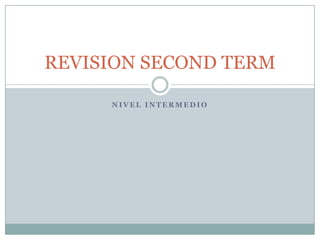
Revision second term
- 1. N I V E L I N T E R M E D I O REVISION SECOND TERM
- 2. SUMMARY VERB TENSES: REVISION OF ALL TENSES* NARRATIVE TENSES: Past simple Past continuous Past perfect MODAL VERBS CAN/COULD/BE ABLE TO OBLIGATION/ADVICE REFLEXIVE PRONOUNS USUALLY/USED TO VOCABULARY: - Adjectives ending in -ed / -ing - Sport - Relationships
- 3. NARRATIVE TENSES Narrative tenses are verb tenses that are used to talk about the past. They are often found in stories and descriptions of past events, such as personal anecdotes. The most common of these is the past simple (for past finished actions). Two other tenses, past continuous (actions in progress at a moment in the past, to set a scene) and the past perfect (actions that happened before another past action) can help us to say what we want more efficiently.
- 4. Let’s tell a story Last summer… I went on holiday around Europe with a friend We travelled by car
- 5. Let’s tell a story and set off at sunrise. We adjusted our satnav…
- 6. Let’s tell a story The day was great, the sun… was shinning. And the road… was deserted. But, suddenly, our car… broke down.
- 7. Let’s tell a story I… decided to phone my car insurance company. But… I didn’t have my mobile phone with me. I had left it at home, charging. AT HOME
- 8. MODAL VERBS CAN, COUL D, BE ABLE TO Can and could are modal auxiliary verbs (they have no other forms). Be able to is NOT an auxiliary verb (it uses the verb be as a main verb) and can be used in all the tenses and forms. Remember: “be able to” in the present or past simple are formal.
- 9. Choose the right option We ______________ go to the party. We're going to a wedding. couldn't will can't want be able to won't be able to I __________ remember his name. can't ’ll can 'm not able to They ____________ go. The weather was too bad. weren't able to couldn't can't Sorry, Teacher. I ____________ do it yet. couldn't wasn't able to haven't been able to
- 10. Choose the right option She _____________ come on holiday next month if her parents give her permission. can't could 'll be able to The fishing boat sank but luckily all the fishermen____________ save themselves. were able to was able to could A. Can you lend me some money? B: Sorry. I __________ . I haven't got any either. couldn't can't 'm not able to Diana ________ the piano. can play is able to play can to play
- 11. MODAL VERBS OBLIGATION: have to / must (modal verb) PROHIBITION: mustn’t (modal verb) ABSENCE OF NECESSITY: don’t have to ADVICE: should (modal verb) / ought to (modal verb) * Should have + past participle
- 12. Fill in the blanks I think people ___________ recycle more paper and glass. should The museum is free. You _________ pay. don’t have to You __________ park here. It's an emergency exit. mustn’t You __________ smoke. It's bad for you. shouldn’t I __________to wear a uniform when I was at school. had to You ___________ to phone if you're going to be late. ought
- 13. REFLEXIVE PRONOUNS Myself Yourself Himself / herself / itself Ourselves Yourselves Themselves Use them: - When the object and the subject of the sentence are the same (e.g. He taught himself Russian= he was his own teacher). - To emphasize the subject of an action (e.g. We painted the kitchen ourselves).
- 14. USUALLY / USED TO PRESENT HABITS: usually, normally PAST HABITS: used to Remember: be used to ( be accustomed to), get used to (get accustomed to)
- 15. VOCABULARY: –ED / –ING ADJECTIVES (File 4A, p. 36) Adjectives ending in –ing qualify nouns that cause the emotion (“Source”). Adjectives ending in –ed qualify nouns that experience the emotion (“Experiencer”) e.g. The children were amazed by the contortionist. She was amazing. Amazed (experiencers) Amazing (source)
- 16. frighten The movie is ________________. The girls are ________________.
- 17. frighten The movie is frightening . (Source) The girls are frightened . (Experiencers)
- 18. amuse This family is ________________. The TV show is ______________.
- 19. amuse This family is amused . (Experiencers) The TV show is amusing . (Source)
- 20. VOCABULARY: SPORT (Vocabulary bank, p. 157)
- 21. VOCABULARY: RELATIONSHIPS (Vocabulary bank, p. 158) meet become friends have a lot in common break up get on propose get married
